It’s pretty rewarding and pretty satisfying to be able to build your own gaming computer. You get to choose what is going to work best for you, and this is a totally personalized experience. And you’re saving money over a pre-assembled system, which is a plus. So let’s go step by step on picking out your components, getting your computer configured and further optimizing performance. We will answer some of the most frequently asked questions people mostly ask in an effort to guide you through the process.
Table of Contents
1.Know your Needs
Don’t splurge into the parts without knowing what you really need. Knowing this part is crucial in understanding the kinds of gaming PCs and even choosing the key aspects for making your system.
Types of Gaming PC
• Entry-Level Gaming PC: These are used by casual gamers who normally play less demanding games and at the lowest settings. These builds usually contain budget-friendly components.
• Mid-range gaming PC: This is for that user who loves playing a number of casual games but also has an interest in occasionally getting into a heavy game. For mid-range, performance costs and cost versus performance usually balance themselves out.
• High-performance gaming PC: This is particularly suited for the dedicated gamer or enthusiast who requires always to be updated on what is in the pipeline concerning performance releases. The builds are, however done with the intent of showing off premium components to support high resolution and refresh rates.
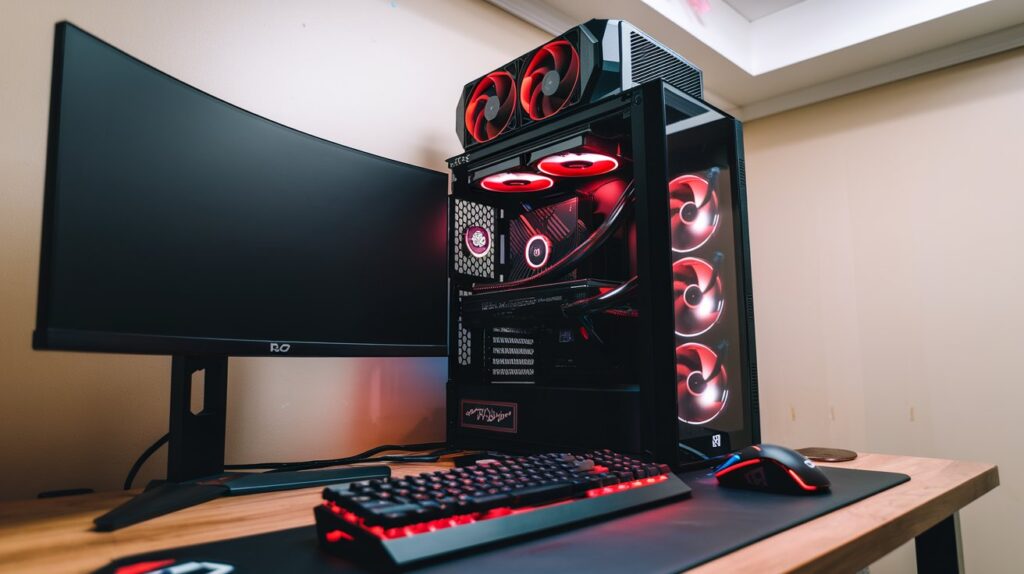
Factors to consider
• Budget: This will determine your choice of component.
• Gaming Style: Types of games. Some games may require certain hardware components.
• Future-Proofing: Identify which components you would actually end up using over the next two years, as you usually do not upgrade in this time frame.
_____________________________________
2. Must-Haves
Now that you know what to look out for let’s go over the bare minimum of your gaming PC.
CPU
The CPU basically is the brain of your PC. Therefore, it will have an enormous influence on your performance. So, check out that one which balances between the number of cores and clock speed to meet your gaming needs.
Top Picks
no Intel Core i5/i7 : Good for heavy productivity, multitasking, and gaming as well.
no AMD Ryzen 5/7 : That can also give you class-leading performance in gaming and productivity.
Video card
A video card is a performance component most of all for gaming, the more so at high resolutions and settings.
Motherboard
Choose a motherboard that will work with your CPU, gives you enough connectivity to all of your parts, and otherwise meets your core needs.
• Core Features
No socket size fits your CPU (e.g. LGA 1200 for Intel, AM4 for AMD)
Only one expansion slot to dedicate to more than one video card or sound card
Ample USB ports
RAM
At least 16GB of RAM. The faster your RAM, the better; however it must be compatible with your motherboard .
Highly Recommended
DDR4-3200: Super speed for the money
DDR4-3600: Good overclocking performance, but great to use with Ryzen processors
Storage
Put the speed along with capacity together. Best combination: SSD + HDD
• for system responsiveness and loads in a second.
• HDD: More large storages at much cheaper prices.
Power Supply Unit (PSU)
Choose PSU that will provide everything the hardware in your computer demands. Efficiency rating by the following 80 PLUS Bronze, Silver, Gold
Overhead Costs;
Best of the Best:;
Between 500W to 750W: depending on how much power that your system will need
Modular PSUs: Very excellent at nice cable management
Computer Case
You’ll also have to pick a case that will keep all of your components with good air flow.
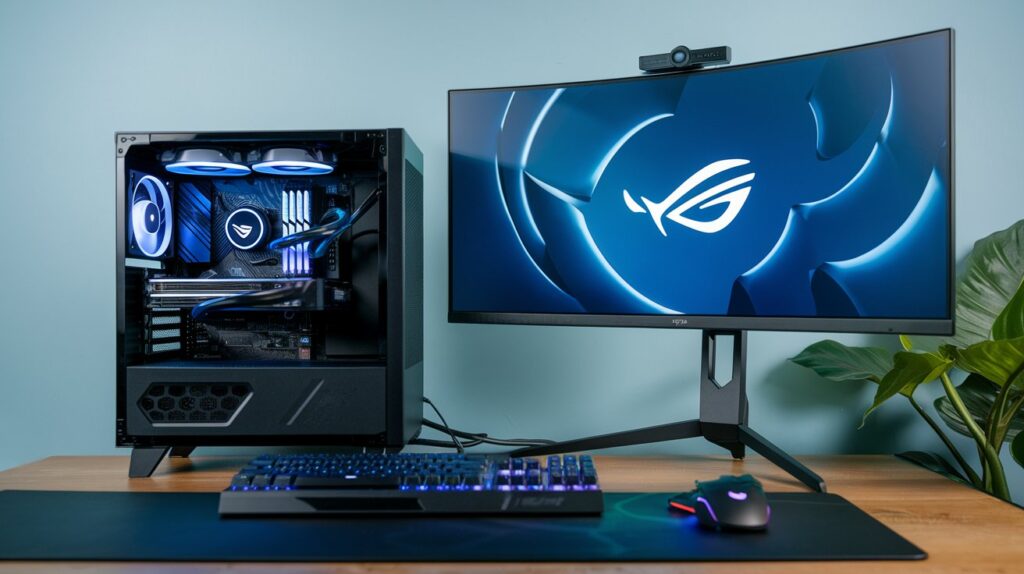
3• Must have Features
Accommodates size with your motherboard (ATX, Micro-ATX, etc)
Good airflow plus cooling options
Looks that you like
____________________________________
3. Bonus Components
Add-ons make the game fun to play
Cooling Solutions
It will run and last for a long time if it has good cooling.
• Air Coolers The cheapest and most reliable.
Liquid Coolers For in-out cooling but at a cost.
Peripherals
Gaming monitors, keyboards, mice and headsets-what to spend your gaming budget on.
• Gaming Monitor Start at a higher refresh rate, lower response time
• Mechanical Keyboard Game-specific feel does better
• Gaming Mouse DPI could be one factor you can enhance
_____________________________________
4. Building Your Gaming PC
Well. Now that you have your parts. Get messy and get ready to start building your gaming PC. Read this step well.
Preparation
• Workspace- Clean, static-free workspace
• Tools- Screwdriver, Cable ties for cable management
Installation Step-by-Step
1. CPU:
Open CPU socket on motherboard.
Clock the CPU and place it gently into the socket.
2. RAM:
Find the RAM slots on the motherboard
no RAM sticks are not initialized in the slot while being mounted
3. Installation of Motherboard:
Mount the motherboard to the case with screws.
4. Installation of GPU:
Mount the GPU in the PCIe slot and screw in by pressing it firmly
5. Connect Storage:
Mount the SSD as well as HDD and connect it with motherboard and PSU
6. Connecting PSU:
All the power cables required which are supposed to come out from PSU and get connected to motherboard, GPU and the storage.
7. Mount Cooling Solution:
Placing the CPU cooler and also checking that there is proper airflow of the case.
8. Cable Management:
No Cable cleaning for good air flow and aesthetics
_____________________________________
5: Installing the OS
Get your hardware and start installing the operating system. Being a gamer you will have to do the thing, which is Windows
1.Download installation media for windows, get bootable USB
2.Installation of Windows: with guides from USB, start the installation process of windows
Installation of Drivers: the latest drivers on your graphics card and others installed after the installation
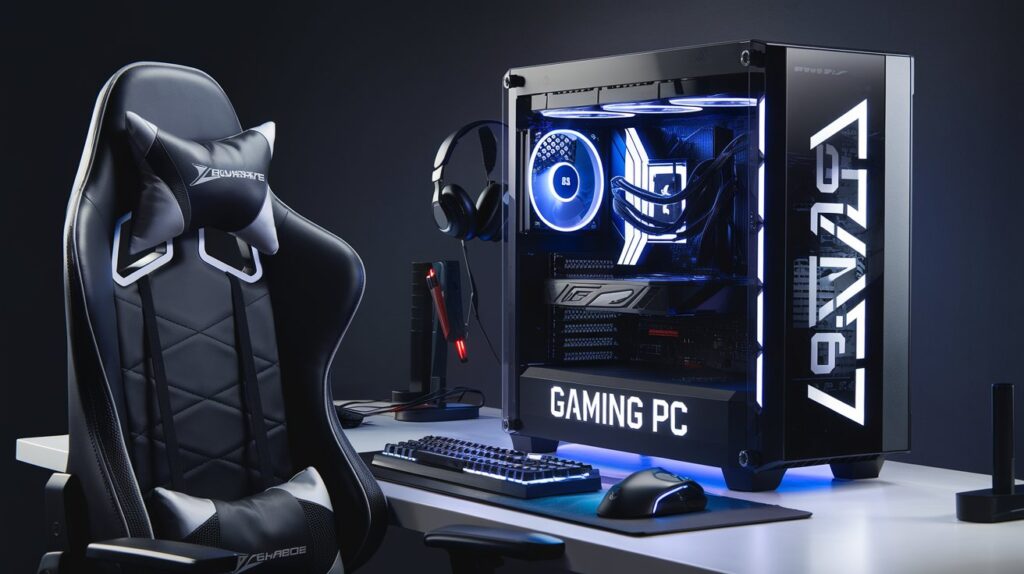
6. Operating System and Software
Windows vs Linux
And if ever one has to choose what OS they would like to use for gaming, then Windows is the most in common OS because it comes from Microsoft. However, if the user is that type who would prefer it if their OS is open source, then Linux also can take care of that. That is also of major importance to take note that not all of the games go well with Linux.
Great Software for Gamers
Other software you should try out is the MSI Afterburner, HWMonitor and OBS Studio which can further tweak your PC and gain control of your gaming streams.
____________________________________
7. Overclocking
Overclocking is optimizing performance if you want the best out of your gaming PC
Types
There are two types of overclocking:
It can either be for your CPU clock speeds or your GPU clock speed as well.
Tools to overclock
You will include MSI Afterburner for your GPU and Intel XTU or AMD Ryzen Master for your CPUs.
Software Tweaks
Tweak your games and run the performance-enhancing software to upgrade your game.
•Game Settings: Run your games on lower graphics to run the game well or make them better for eye-catching views.
•Game Mode in Windows: Run this to upgrade your game.
________________________________________
8. Upgrading and Maintaining Your PC
Key Upgrade for Future
Changes in the game and software means you would always replace parts like GPU, RAM, or storage for your build to always run.
Best Precautions in Routine Maintenance
Dust off the system, keep on updating your drivers, and watch out on temperatures so that your PC always remains fresh.
9. Errors to Avoid
Some common errors are wrong parts at procurement, which may not go well with each other. Then there’s the cable management. All these will save you from that waste time and frustration in the build.
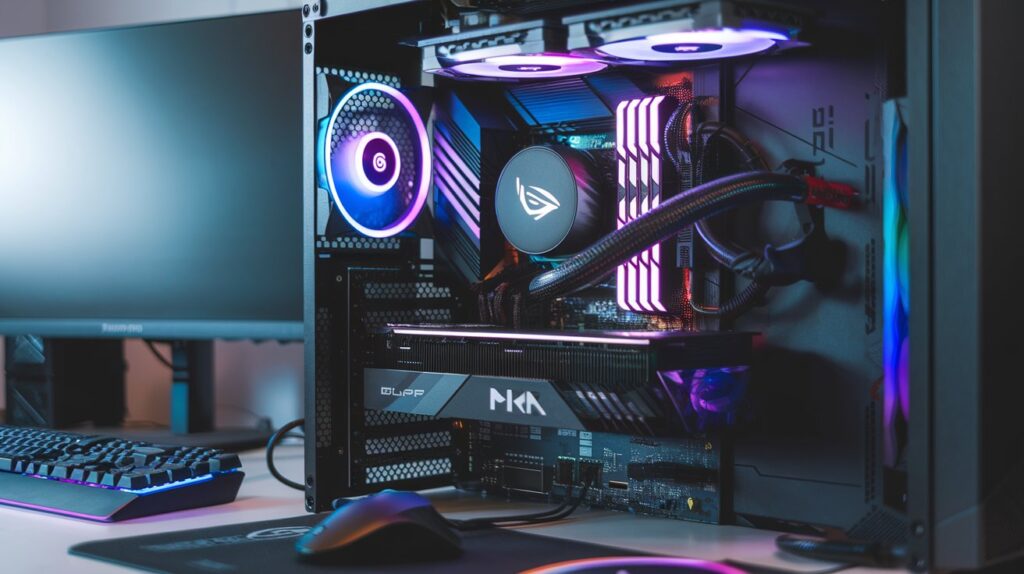
_____________________________________
10. FAQs
1. Is it hard to build a gaming PC?
For a fresher, building a gaming PC would just be an intimidating experience. However, that can be very much possible if you have the right kind of guidance and patience. Below is a step-by-step guide on how to make the process less painful.
2. How much should I budget for a gaming PC?
This is a mid-line PC that would be great for playing games, and it runs around the price of about $800 to $1,200. Entry-level costs around $500, while high-end goes as high as $2,000.
3. How do I play games on a laptop?
Well sure. Laptops are more than fine for most games, but remember that they also have their own disadvantages as well.
While gaming laptops would be enough in general, desktop gaming PCs upgrade and run way faster .
4. What shall I focus?
If on a budget then it shall be about focusing the areas of the GPU and the CPU. These are where the actual magic happens for a gaming performance.
5. How often should I update my gaming PC?
Depends on your needs. You just refresh every 2-3 years if you do not get the desired performance out from the newly released titles.
____________________________________
11. Conclusion
The most exciting part while building your gaming PC is that you are able to design your gaming rig any which way you like it to be. Whatever it is-knowing your needs, choosing the right components, or step-by-step instructions to build in this book-you can put together some very good efficiency for a gaming machine. Don’t forget that you would take proper care of your PC and update as you need, and roll out the best gaming performance for years to come.
Gaming for fun!

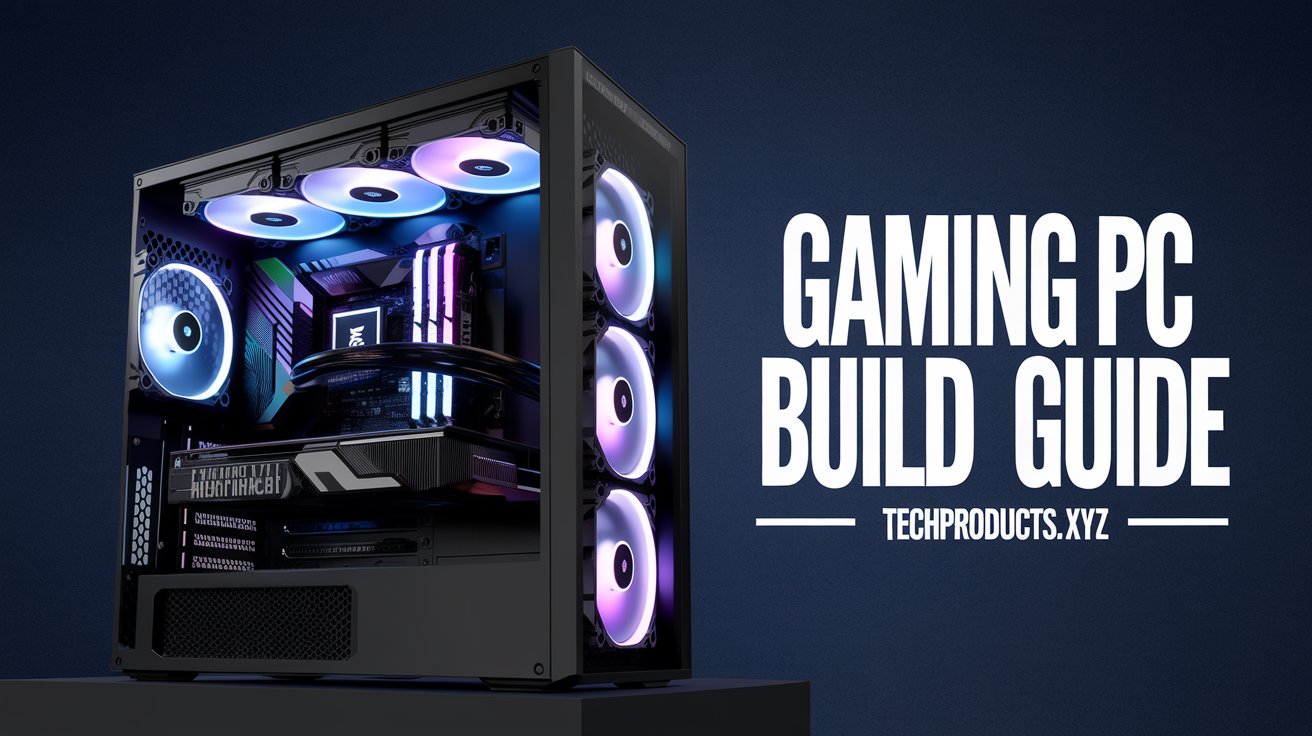
1 thought on “Gaming PC Build Guide”